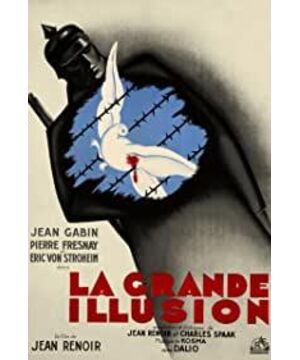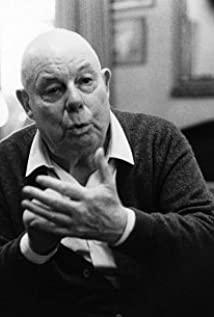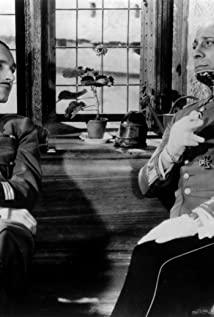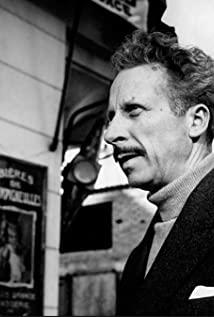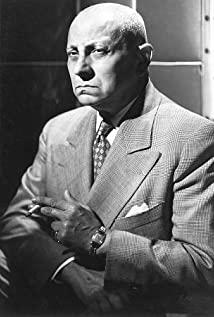"The Great Phantom records the last glimmer of European civilization. Driven by the civilization left by mankind for thousands of years, the boundaries of all classes or institutions, like this long war, are but a great phantom." - Zweig
big fantasy
"The Great Illusion" literally translates to "The Great Illusion". People used to call the war "The Grand Illusion". Both sides claimed to be victorious within four weeks. In fact, the war lasted for four years (1914- 1918). What is fantasy? Why Phantom? Nietzsche said: "Even if nihilism comes, people can re-evaluate and rebuild new values in order to obtain a reason to survive." War is for fantasy, but fantasy turns into phantom. We create despair in exchange for hope; war orders People are outrageous, and anti-war is not necessarily all good. There are many wars going on today, and I still can't understand it; Break the embankment; what the hell is going on in this world? Why are there so many people who, in the face of what they deserve, need to bleed to get it back? Flowers and bayonets, I know that those are bound to come, however, I still have no choice, as Bodiosso said: "The best outcome for us is to die." Rofenstein replied: "I have missed such an opportunity. ”
Boundaries and Classes - Invisible Lines
"This is a story about human relationships, and I'm sure this is a problem that needs to be solved, otherwise, we can only say a final goodbye to this wonderful land." - Renoir
"The Great Phantom" is like the text of "Rules of the Game", which deeply explores the rules of this game of human beings. Rules are demarcation, and demarcation is the motif of human beings. Renoir, through poetic realism, reproduces all kinds of people in the same time and space, whether it is a grand world war, or a closed high-class manor, as long as there are people, the game will be played. It starts to operate, dividing, grading, classifying, countries, races, languages, religions, assets, nobles, etc., endless divisions and affiliations. There is no real unity among people, and there has never been a real division and class. The game is constantly running, relying on the small desire at the beginning to expand greedily. The war is just a glimmer of light in this great illusion, a bloody allegory; When Marshall and Rosenthal fled to the Swiss border, the plot, dialogue and pictures shot through the crosshairs: "The borders only exist on the map, you can't see them in reality." Who divides the borders? Who divides the classes? Who divides the opposition of war? Who, in the name of politics, drew down these "rules" that only exist in the media and documents; and in reality, who can see it? Douaumont belongs to France today, but it will be Germany tomorrow. The war is nothing but a game of demarcation of borders; the high-pitched Marseillaise evokes the national superiority of the French prisoners, and also the victory or defeat of the military prisoners above it. It is the class that establishes the family wine of the class, and the Marshall in the confinement room thinks that the soul and the body, which kind of freedom is higher? Perhaps the soothing harmonica is the most advanced. On this vast border, the "rules" save them from being shot, but they also fail to answer, in the prison, outside the prison, a wall is drawn, where is the freedom? Where is the hope? Prisoners of war and battlefields are only two-way despair, endless escapes and escapes, not the hope of freedom, but the cycle of war tragedy; when the big vision looks down on two tiny and staggering figures, although it is smokeless and dark, that Snow white is endless.
"My main theme is one of the goals I have always strived to pursue since I started working in film, that is, the unity of mankind." - Renoir
Dark realism, from the perspective of humanitarianism, actively seeks the ultimate fantasy of human unity in the obscurity of human nature. Renoir represents not a group, but an individual, for whom the enemy is just another victim forced into the game. The prisoner of war camp was centered on the individual and crossed the boundaries of classes. In the dark age, it showed the compassion and brilliance of human nature; the salute to the enemy's victims, the joy of the military and prisoners' gatherings, and even the German army's own lack of food. The delicacy and delicacy in the prisoner of war's package are still abiding by the sincerity and truth; many delicate points in the film are profoundly presented. The incredible respect and friendship between the German army and the prisoners of war is truly a pity between individuals. It is a pity that the post-World War II world, a game driven by desire, has been bred by endlessly greedy beasts to develop extremely evil rules.
Class revolution - the fall of the nobility
Classes are groups, but they are differentiated, individuals are independent, but inclusive, and the relationship between different classes seems to be estranged on the surface, but they are relatively floating; take Marseille as an example: he believes that he has a class difference with Bodio, and he escaped from prison. But it was the nobles who sacrificed their lives for the commoners; when they fled, Rosenthal's foot injury also caused Marshall to abandon the wealthy businessman who had been generous to him for a while; Affection. Human beings are repeatedly exclusive in different contexts, but they are constantly looking for commonalities; prison warden Rofenstein has an irreplaceable sense of belonging to the prisoner of war Bodio, who is also an aristocrat and an affairs officer, and has an irreplaceable sense of belonging. The finishing touch and the sublimation, as Bodio laments: "The plague is usually our privilege, and now we lose it, just like everyone else, everything is universal; cancer and gout are not diseases of the working class, but Sooner or later, believe me...you and I can't stop the progress of the times... We (the nobility) are no longer needed. "The prisoners of war and the warden, who are both powerful and powerful, echo the shuffling of the times between divisions and commonalities. The French Revolution overthrew the powerful as a class and replaced them with the upper ranks of the bourgeoisie. In the process of secularization, the traditional aristocracy returned to ignorance, and dignity, status and fame gradually disappeared; and World War I seemed to coincide as an elegy for the aristocracy, It has become an epochal proposition, announcing that the international community of European upper class aristocracy, just as the river goes east and the waves are washed away, this upper class empire that once surpassed the state has been replaced by the rising nationalism of nationalism. The vertical power struggle between the top and the bottom of the world has been subverted into a military confrontation between parallel countries. The value of this battle seems to be far beyond World War I in human history. With the boundary, however, this is really just a restart of the game, and even the rules have not changed. Facing the structural reaction of class in an era, Renoir once again dissociated class groups and went deep into the interweaving between individuals; nobility was no longer just a pronoun for praise or derogation, but a symbol of the deepening nobility, upbringing and culture of a human being; The contradictions and struggles in the environment and its personal world are more profound and complex than the generalization of labels, and reflect the most real moment of the traces of the human soul in an era; the German military noble with a broken spine, leaned over to complete the noble etiquette of bowing his head. , Renoir reproduces such complex emotions and ideas with restraint, coldness, and ingenious craftsmanship, alleging that under the torso of decay, there is an upbringing and culture that is tough and uncompromising, such a solemn arrogance, the treatise seems to be It is profoundly righteous, but it has long been a candle in the wind. In this age that does not need culture, it has long been unintentional. The prisoners of war who spend their days and drinks have gradually forgotten that the concentration camps that imprisoned them are centuries of architectural art, but the prisoners of war wearing women's clothing are enough to make the whole camp stand still; the books donated by the tsar have become The meaningless vanity, power and culture were lost in the expectations of wine and meat, and they were burned to the ground. The war has turned all the fantasies of freedom and peace back into phantoms. The greed that people feed to the times now feeds back the cruelty and lust of human instinct; the rules have collapsed, but the game is still going on. It used to be compared to the hypocrisy of hiding the true self. Now the fight is to give up the nakedness of the soul.
Rules of the Game - The Great Phantom
Bodio escaped from prison four times and escaped back to the manor? Or the street? Heating pipes, trash cans, sewers, laundry baskets, on the one hand, Bodio is powerless to cover up the erosion of secularization, while on the other hand, it cannot take off the elegance and decency of the nobles. "The Great Phantom" is by no means a prelude to "Rules of the Game". The manor has been demolished, and the rules have become phantoms. Without rules, there would be no games. Without games, it would be a battlefield of pure destruction. Now the battle is for life, and it is the lower limit; Bodio deceives himself in desperation, such hypocrisy can be regarded as noble on the battlefield, but also shattered, "For ordinary people to die in war is tragic, but for us It's probably the best place to go," Bodio added. "The Great Phantom" is more cruel than "The Rules of the Game". Comparing the two, the faces of the vested interests in "The Rules of the Game" are simply a symbol of luck, and "The Great Phantom" no matter which side, regardless of class, Ma Xie Or Rosenta, Rofenstein, or Bodio, who said to him, "Don't have pity on me, for me it will all end, soon, but you have to keep going." And yet, how can you keep going? Every player in "Rules of the Game" can follow the rules according to their free will, but none of the warriors under "The Great Phantom" can control their own destiny, but they still play it drowningly. The only class and demarcation; "rules" have become the key to the top of these two classics. At first glance, rules may or may not exist, but they are just empty appearances. " or "hypocrisy", but was replaced by "sincere" or "dignified" in a grand manner, just like Eve and Adam in the Garden of Eden, who were led and tempted by Satan to taste the fruit of the tree of knowledge of good and evil, when did they realize that they were naked? When will you pay the price of animal life in exchange for wearing animal skins? The "rules" of this human game, like most games, are based on the trading mechanism. What is the exchange of infinite greedy desire? Selling the souls of all mankind, an endless desire for usury. Either "compromise" goes with the flow, or "suffering death" leaves calmly, "The Great Phantom" and "Rules of the Game" seem to have returned to the end of the game in a fateful and hopeless manner; however, poetic realism is not willing to revolve around the superficial two. Meta-choice, Renoir embraced the delicate and intricate ambiguity with compassion through macroscopic observation without judgment, and took this statement as a human flow within his reach, and finally, through poeticization, the characters, plots, ideas, atmospheres. , reproduced in realistic mise-en-scene, double depth of field, long-shot movement. In terms of results, Bodio seems to be generous, but in fact it is like a war outside, in the body. Faced with the painful battle of compromise; under the seemingly heroic sacrifice, it was the inevitable tragedy caused by the reversal of class and disorder, and the nobles became victims of their subordinates instead of heroes. Bodio's final struggle was only powerless, choosing a reluctant one. It was a decent compromise. It seemed even more decent. It was two subordinates who escaped from prison calmly, leaving the embarrassed Bodio to hide and besieged on the roof of the prisoner of war camp; however, there were even more unbearable people, pleading The warden Lofenstein, who was brought down by the prisoner of war Bodio, put down the class between officials and prisoners and his loyalty to the country, and compromised between personal feelings; and the seemingly decent shot put down the common friendship among the nobles. The true compromise of wartime class divisions is a betrayal of souls. The layers of decency and compromise are intertwined, intricate, and even completely reversed, which is almost human, but Renoir did not stop there; Bodio gently comforted Rofenstein before his death: "Yes, I will do the same." Yes. A deep and simple empathy, but also an unintentional humiliation; in the prison cell of ivy and nettle, the snow is falling, and the only blooming geranium flower is cut by Rofenstein, which is carefully cared for and offered on the windowsill. Yes, what is it? It seems that there are tens of thousands of words that can be applied, soul, affection, power, upbringing, culture, nihility, compromise, despair, death... But in the end, the words do not convey the meaning; Renoir keeps advancing little by little, as if The oxygen-deficient tunnel was dug in the prisoner of war camp. At dawn, the camp was changed. "Don't shoot. They are in Switzerland." Who defines life and death? I have never seen anyone like Renoir, who wrote two chapters and a book in the language of the film, a masterpiece of human philosophy that summarizes all human beings and penetrates into the fibers of the soul; however, even so, it is still in vain, the rules of the game are just a game The Great Phantom, whether obeying or violating, is forced to be bound by the rules, as in "You're Special", the Vermec full of stars and black dots, amazed to see the pure and clean Lucia, and the carpenter Eli symbolizes The Redeemer of the full law of the New Testament is to save mankind from the rules of this game. When the boundaries and classes are eliminated, it is like the chaotic language on the Tower of Babel. All human beings are instantly speechless, leaving only the ambiguity scattered in the air; "A child is like a soldier outside, and a soldier inside is like a child." Standing in the prisoner of war camp, looking out the window and sighing; just like a new game, in today's society it repeats the elimination and aphasia, are we really getting closer to equality and sincerity? 80 years later, only to realize that history just keeps dying, and then reloading, the game remains the same, and the rules remain the same. But in the end, the words didn't make sense; Renoir continued to advance little by little, like a tunnel dug into an oxygen-deficient prisoner of war camp, and at dawn, he changed camps. "Don't shoot. They are in Switzerland." Who defines life and death? I have never seen anyone like Renoir, who wrote two chapters and a book in the language of the film, a masterpiece of human philosophy that summarizes all human beings and penetrates into the fibers of the soul; however, even so, it is still in vain, the rules of the game are just a game The Great Phantom, whether obeying or violating, is forced to be bound by the rules, as in "You're Special", the Vermec full of stars and black dots, amazed to see the pure and clean Lucia, and the carpenter Eli symbolizes The Redeemer of the full law of the New Testament is to save mankind from the rules of this game. When the boundaries and classes are eliminated, it is like the chaotic language on the Tower of Babel. All human beings are instantly speechless, leaving only the ambiguity scattered in the air; "A child is like a soldier outside, and a soldier inside is like a child." Standing in the prisoner of war camp, looking out the window and sighing; just like a new game, in today's society it repeats the elimination and aphasia, are we really getting closer to equality and sincerity? 80 years later, only to realize that history just keeps dying, and then reloading, the game remains the same, and the rules remain the same.
postscript
It was my luck in three lifetimes to see two of the greatest films in the history of human nature; Orson Welles even listed The Great Phantom as one of the films he would take on the Ark. Poetic realism, double depth of field, long-lens movement, and mise-en-scène, naturally no need for nonsense; French, German, English, and Russian are mixed to complicate and dramatize the motif of "demarcation"; the stage is also Renoir " essential elements under the proposition of "game"; and between black comedy and realistic tragedy. "The Great Mirage" won the Best International Film at the Mussolini Cup in Venice for its "anti-Semitism" and was also popular in some countries that believed the film put the Aryans above the Jews; The film was banned for being "pro-Jewish"; now, it is rumored to be the number one work in the standard collection of fans.
View more about La Grande Illusion reviews


